By:
- Christine Clark
Published Date
By:
- Christine Clark
Share This:
Charting the Pacific Century
School of Global Policy and Strategy reach continues to grow with impactful 30th anniversary events and activities
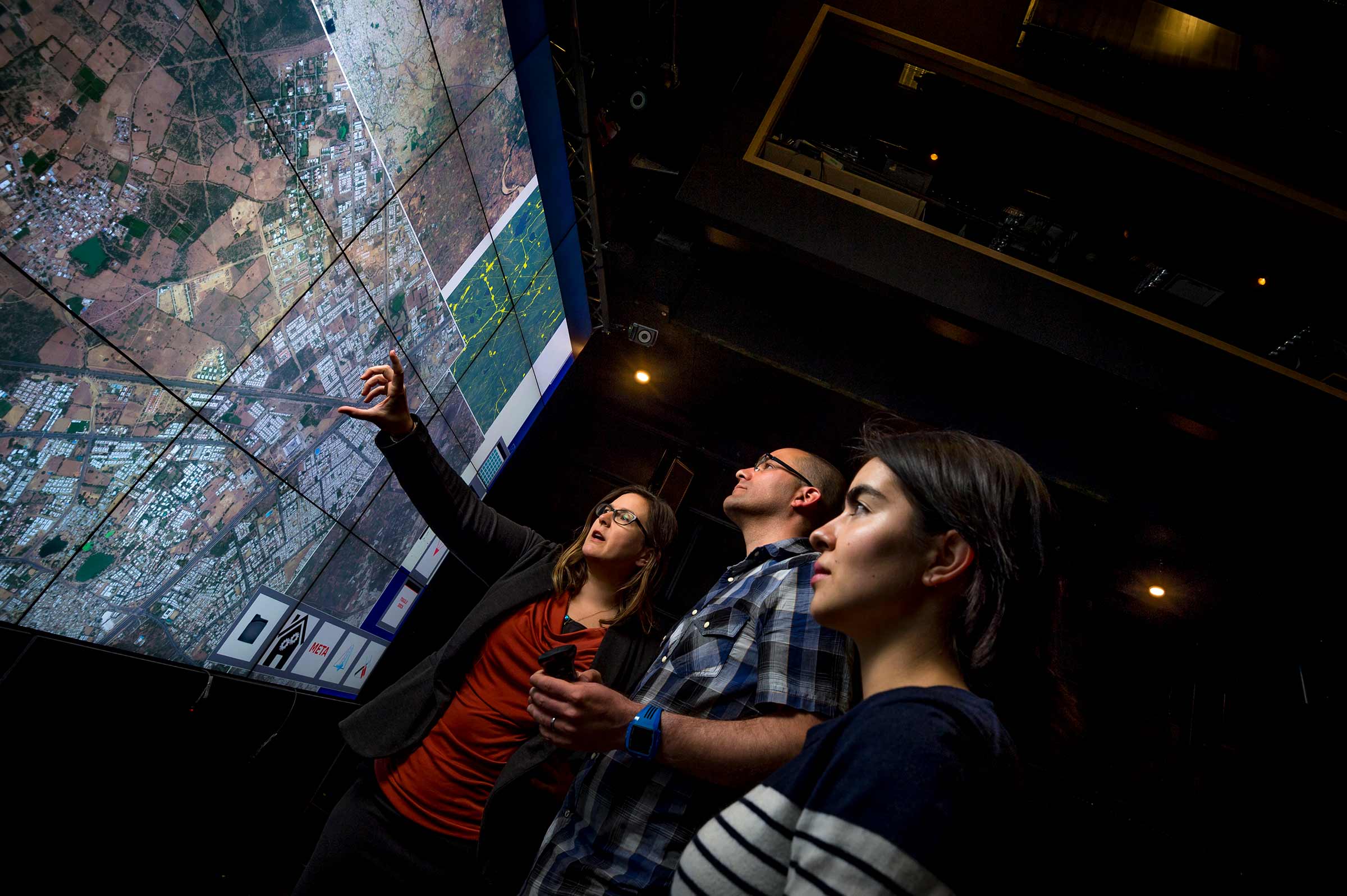
Impactful research initiatives launched by the school include the Big Pixel Initiative where researchers use unique tools to map urban areas around the globe, potentially revolutionizing large-scale analysis of urbanization. This is one example of how faculty at GPS truly look at global problems through a variety of interconnected lenses. Photos by Erik Jepsen/UC San Diego Publications
Is investing in nuclear energy key to mitigating climate change? Is voter fraud as common as alien abductions? And, who will be the winners and losers from the U.S. trade wars?
Scholars at the University of California San Diego’s School of Global Policy and Strategy (GPS) are not afraid to ask and answer such complex and engaging questions with empirical data, bold research and thoughtful analysis, all in an effort to understand and improve global societies of the 21st century.
“When I got here, I immediately felt at home because every single person at the school was doing really complex, question-driven research,” said Jennifer Burney, an associate professor who joined the GPS faculty in 2011. “It is really grassroots, interdisciplinary research: political scientists are working with physicists, economists are working with climate scientists. The faculty here really care about important issues. They are motivated by big crucial questions, and there are no boundaries as to how they find the answers.”
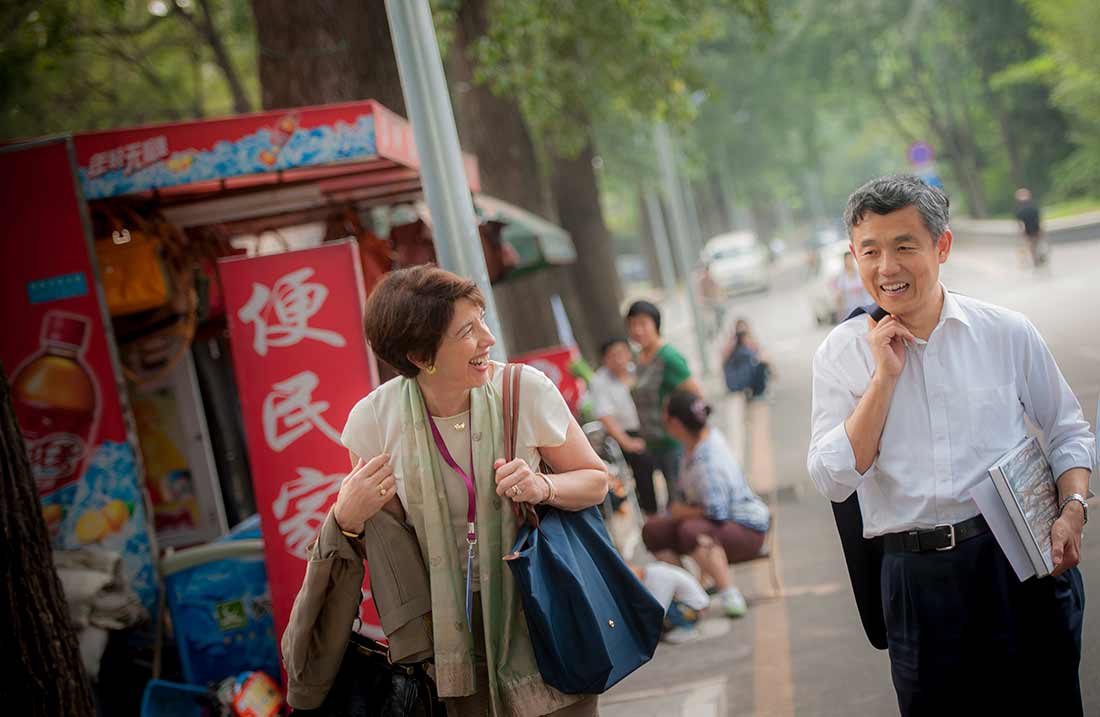
GPS has the highest concentration of experts on China than any other university in the United States. Scholars include Susan Shirk (left), former deputy assistant secretary of state and current chair of the 21st Century China program.
The school was founded on bold, solutions-driven principles, and is celebrating its 30th anniversary this year by reflecting on past achievements and further pushing boundaries as an incubator for cutting-edge policy design and research for Asia, the Americas and beyond.
Anniversary events and initiatives underway include the launch of San Diego 2049, an interdisciplinary program for graduate students whereby they use the tools of science fiction writers, namely world-building and speculative design, to conceive problems and define policy solutions for issues that could face San Diego in the year 2049. Additional events include a monthly webinar series titled Designing Policy for a Global Impact, which showcases GPS faculty, alumni and student research and demonstrates how social science research informs and improves public policy to enhance lives throughout the globe.
On the horizon, the school will host a two-day event April 26-27, 2019 including prominent international speakers and a featured talk by Harvard cognitive psychologist, linguist and popular science author Steven Pinker. The celebration will culminate in August 2019 with a forum on U.S.-China relations featuring high-level diplomats, elected officials and acclaimed experts.
Looking back, yet always moving forward
In June of 1989, GPS—then known as the Graduate School of International Relations and Pacific Studies—graduated its first class of master’s students.
The founders of the school took a calculated risk. Contrary to other international relations programs at the time, they established a school where the intellectual rigor of the faculty and students would focus on understanding the political and economic rise of Asia and Latin America.
Deliberately interdisciplinary, regionally focused, and data driven, GPS was, and continues to be, at the forefront of advancing the Pacific Century.
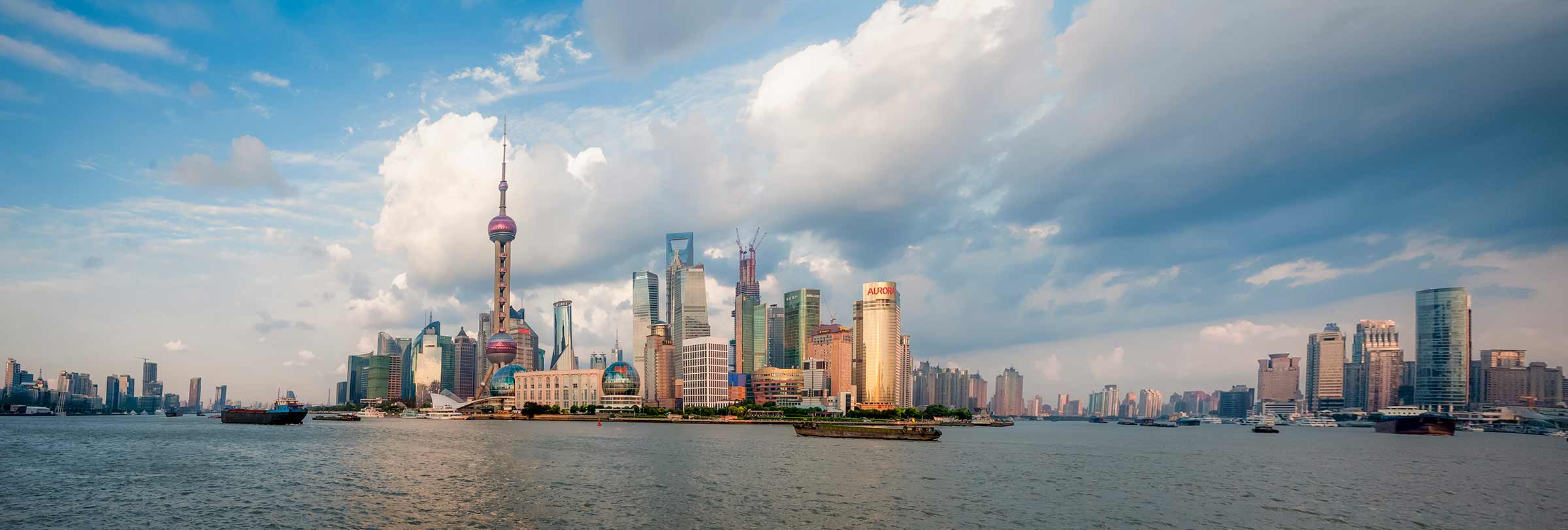
The school’s formidable scholars on Asia and Latin America have shaped the creation, implementation and evaluation of international and domestic public policy.
“With the Pacific region serving as the new fulcrum point for global dynamics, we are well positioned to ask fundamental questions about the future of the new world order,” said the school’s founding dean, Peter A. Gourevitch. “From day one, our institution brought together scholars from multiple disciples to work collaboratively—long before it was popular to be labeled interdisciplinary—and truly look at global problems through a variety of interconnected lenses. This tradition continues today.”
In just three decades, the school has spawned 11 faculty-led research centers, with programs that engage students and the community and encompass a range of topics that reflect the school’s mission and research impact worldwide.
“Change, in the form of technological, political and economic advances, is in the DNA of our teaching and research,” said Dean Peter F. Cowhey, who joined the GPS faculty in 1989 and became dean in 2002. “We have expanded our horizons as the world has evolved, analyzing the policy impacts of technological advances. As digital technologies enable more powerful initiatives for change, both positive and negative, across the local and regional levels, we prepare our students with the tools to asses its impacts in every corner of the world.”
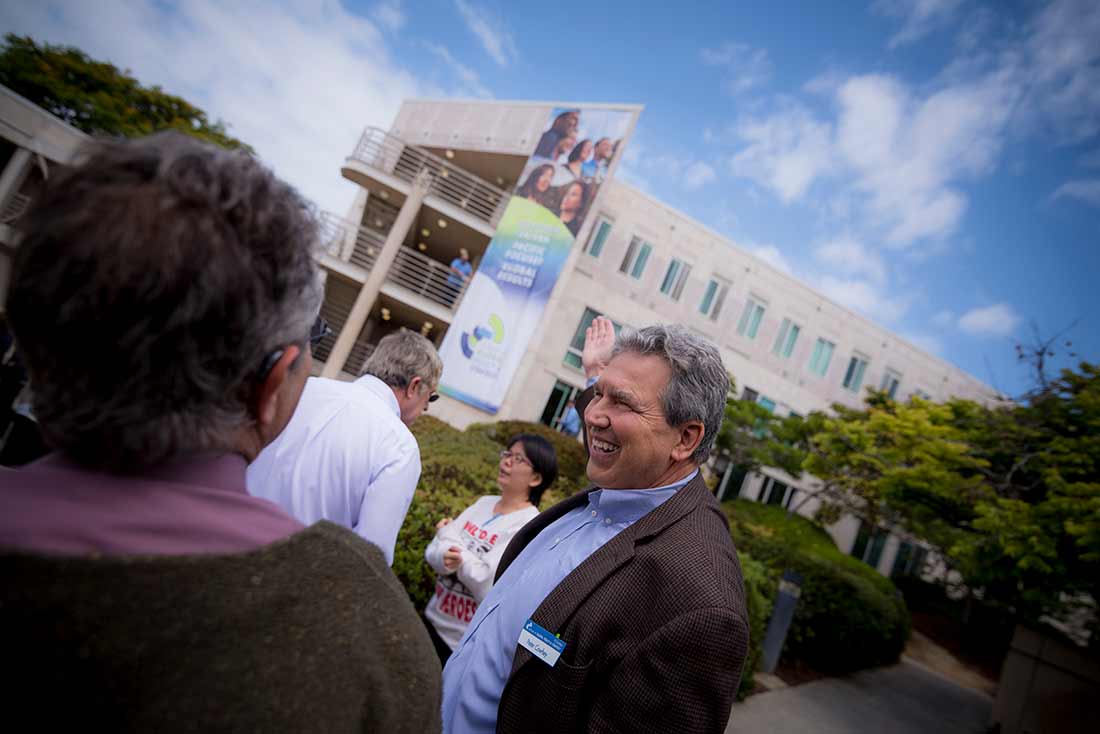
Dean Peter F. Cowhey the School of Global Policy and Strategy hub, located in the Robinson Complex. Cowhey joined the GPS faculty in 1989 and became dean in 2002.
In the last decade, the school has also expanded its curricular offerings and launched three new master’s degrees, including an instantly sought-after Master of Public Policy (or MPP). The degree expansion has allowed for the GPS alumni network to grow and flourish. GPS alumni are life-long learners who go on to hold positions of leadership in government, industry and nonprofits throughout the world.
Chris Backemeyer, who earned a master’s degree in Pacific and international affairs in 2004, is just one example. As Deputy Assistant Secretary for Assistance Coordination and Press and Public Diplomacy, his work focuses on areas of the world plagued by the conflict in Syria and ISIS.
“Working for the U.S. State Department in the Bureau of Near Eastern Affairs has given me a firsthand look at some of the most important foreign policy challenges of our time,” he said.
Gabriela Rubio Moreno, recent graduate of the Master of Public Policy program is making an impact with her work for the Earthquake Engineering Research Institute. Her role aims to assess socioeconomic impacts for an Earthquake Scenario originating from the Rose Canyon Fault. The binational effort is of critical importance to the border cities of San Diego and Tijuana.
“My experience as a graduate student at the School of Global Policy and Strategy was one of my most rewarding,” Rubio Moreno said. “I have always thought of myself as an agent of change, and with the skills I acquired I feel very motivated to continue working towards building a better world for all.”
Faculty making an impact
The school’s greatest strengths continue to be driven by its world-class faculty whose teaching and research goes beyond the classroom to have a global impact.
The school has the highest concentration of experts on China than any other university in the United States. Additionally, its Center for U.S.-Mexican Studies has been the go-to source for serious academic research on Mexico and U.S.-Mexico relations. Both areas expertise have shaped the creation, implementation and evaluation of international and domestic public policy.
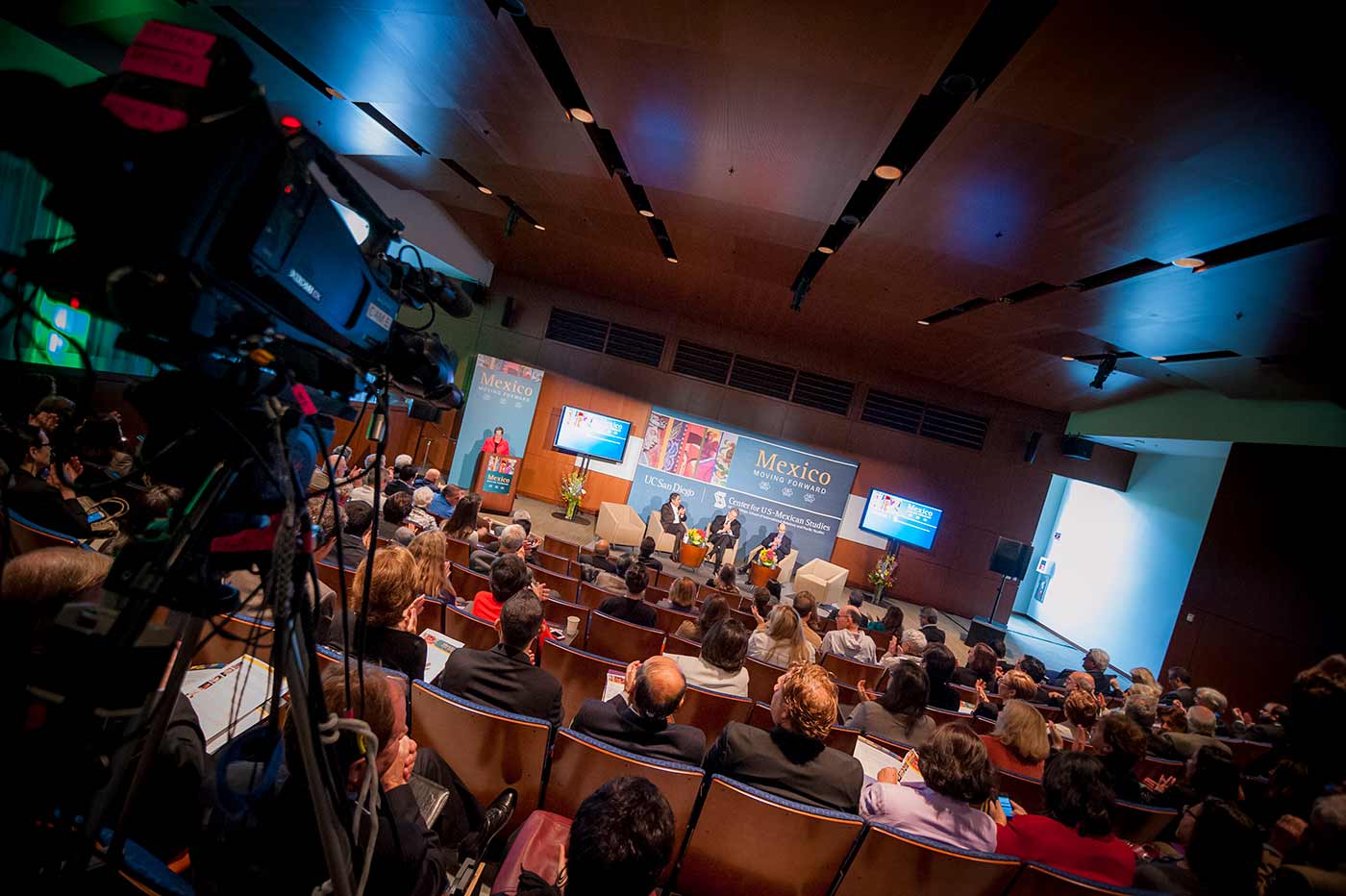
The School’s Center for U.S.-Mexican Studies has been the go-to source for serious academic research on Mexico and U.S.-Mexico relations. It often hosts high-profile policymakers from both sides of border for substantive public events.
Although GPS’s roots are in political science, economics and management, its reach has broadened and today, faculty come from the fields of atmospheric science, neuroscience, engineering and more, representing UC San Diego’s broad strengths across disciplines.
The school’s scholars are not just interdisciplinary; they are hugely collaborative with other world-leading experts on campus, across the U.S. and abroad, developing research breakthroughs that benefit the globe.
Examples of faculty from GPS who are shaping policy include:
Zoltan Hajnal: The professor of political science and faculty-lead of GPS’s Masters of Public Policy program has written a series of reports, articles, books and public pieces that demonstrate that moving from off-cycle local elections that are not held concurrently with statewide or national contests to on-cycle doubles or triples turnout. The impact of this work has led the City of Los Angeles to move to on-cycle elections. In addition, he has produced prolific research on how voter ID laws have a disproportionately negative impact on racial and ethnic minority voter turnout and are thus discriminatory. He is now serving as an expert witness on a case on Alabama’s strict voter identification law and has worked on a similar case in Wisconsin.
Gordon McCord: With an extensive background in sustainable development and research at the intersection of development economics, public health and the environment, McCord, an economist, will represent UC San Diego as part of the United Nations Sustainable Development Solutions Network. The network mobilizes global scientific and technological expertise to promote practical solutions for the implementation of the Paris Climate Agreement and UN sustainable development goals. He has advised developing country governments on integrated rural development and poverty programs using data-driven approaches.
Barbara Walter: An expert on security, civil wars and rebel groups, Walter is frequently sought after by the highest levels of government and U.S. military. The professor of political science is often asked to give briefings in Washington D.C. at the CIA, Department of Defense, Department of State, U.S. Central Command (CENTCOM), and by the United Nations. Walter has also become the go-to person on the Syrian civil wars for CNN International, appearing on live television over 30 times since early 2016. Her rigorous scholarship on civil wars, extremism and terrorism continues to shed valuable light on the world’s conflicts and informs decision-making on U.S. foreign policy.
The School of Global Policy and Strategy is hosting activities throughout the year in recognition of its 30th annivesary. For detailed list of events, click here. Signature events include:
- Jan. 16, 2019: Defense Research Showcase and Herb York Memorial Lecture
UC San Diego receives a substantial amount of funding for defense research and this day-long showcase will highlight key projects and culminate in a keynote address by Retired United States Navy Admiral Scott Swift. Swift will discuss maritime security challenges and opportunities in the Indo-Pacific. Hosted by the UC Institute on Global Conflict and Cooperation.
- April 26-27, 2019: Two-Day Signature 30th Anniversary Event
Friday, April 26 - Forging the Pacific Century, Day One
A day of panel discussions with international thought leaders on topics likely to dominate the news cycles of the next thirty years. Conversations will range from fusing technology and public policy, to the fate of democracy and more. Steven Pinker will serve as the keynote speaker.Saturday, April 27 - Forging the Pacific Century, Day Two
A day of celebration, guests are welcomed to campus for food, conversation, poster sessions and “big idea” talks by GPS faculty and other experts on four key challenges to continued progress in the 21st Century: the challenge of equality, prosperity, sustainability and conflict. - August 2019: China Forum
This five-day event will feature panel discussions and special guest speakers centered around U.S-China relations. World-leading experts, elected officials and diplomats from the highest government levels and members of the national media are expected to attend.
For more information on GPS’s 30th anniversary, go to the GPS UC San Diego 30th anniversary website.
Share This:
You May Also Like
Stay in the Know
Keep up with all the latest from UC San Diego. Subscribe to the newsletter today.



